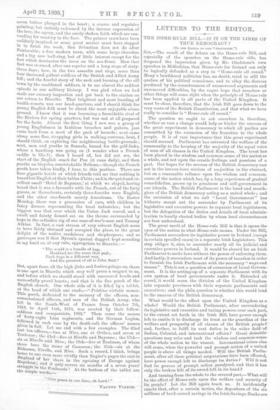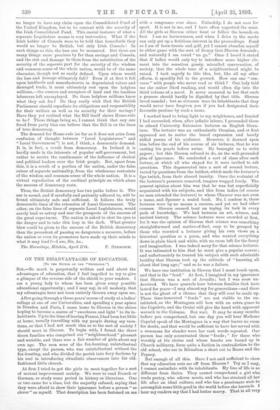LETTERS TO THE EDITOR.
THE HOME-RULE BILL.—IS IT ON THE LINES OF TRUE DEMOCRACY?
[To TUB EDITOR OF ToB "SrEoTA.Tou."]
Sin,—The result of the debate on the Home-rule Bill, and especially of the speeches on the Home-rule side, has deepened the impression given by Mr. Gladstone's own speeches in Midlothian, that Home-rule for Ireland can only be logically defended as a step to "Home-rule all round."
Many a bewildered politician has, no doubt, tried to still the qualms of his political conscience, and to allay the distress produced by the consciousness of unanswered arguments and unremoved difficulties, by the vague hope that somehow or other things will come right when the principle of Home-rule has been applied to all parts of the United Kingdom. It must be clear, therefore, that the Irish Bill goes down to the very roots of the British Constitution, and that what we have really to consider is "Home-rule all round."
The question we ought to ask ourselves is, therefore, whether so vast a change would help or hinder the success of the great experiment in democracy to which all parties are committed by the extension of the franchise to the whole people. It is of vast importance that this great experiment should succeed. Parliament has entrusted the welfare of the community to the keeping of the majority of the equal votes of men of all classes in the United Kingdom. The trust has been placed in the wisdom and common-sense of the nation as a whole, and not upon the erratic feelings and passions of a part. Our hopes for the success of the British democracy rest not in the heaven-born wisdom of majorities in the abstract, but on a reasonable reliance upon the wisdom and common- sense of the nation which has, by a long experience of gradual consolidation, grown up to greatness and self-government in our islands. The British Parliament is the hand and mouth- piece of the British democracy acting as a united whole ; and the extension of what we call "Local Government" has hitherto meant not the surrender by Parliament of its legislative and executive powers to separate local legislatures, but the delegation of the duties and details of. local adminis- tration to locally elected bodies by whom local circumstances are best understood.
The great merit of the Home-rule Bill is that it opens the eyes of the nation to what Home-rule means. Under the Bill, Parliament surrenders its legislative power in Ireland (except in certain specified cases) to a separate Irish Legislature. This step obliges it, also, to surrender nearly all its judicial and executive powers in Ireland. It would be absurd for an Irish Parliament to make laws without the power of enforcing them. And lastly, it surrenders most of its power of taxation in order to furnish the Irish Parliament with the necessary " ways and means." This is not a question of extension of Local Govern- ment. It is the setting-up of a separate Parliament with its own system of local governments under it. Extended all round, it would mean the division of the United Kingdom into separate provinces with their separate parliaments and executives ; and the plain question is whether this would tend to the success of the British democracy.
What would be the effect upon the United Kingdom as a whole ? Would the British Parliament, after surrendering its legislative and executive and taxing powers over each part, to the extent set forth in the Irish Bill, have power enough left to enable it to discharge its trust as the guardian of the welfare and prosperity of all classes of the British people P and, further, to fulfil its vast duties in the wider field of Indian, Colonial, and international affairs P Great domestics questions may arise and task the wisdom and common-sense of the whole nation to the utmost. International crises also will come, when the powerful and prompt action of a united people is above all things needed. Will the British Perlin- ment, after all these political amputations have been effected, have power enough left to discharge its duties P Willit not find its powers of prompt action paralysed, and that it has only the broken hilt of its sword left in its hand ?
And turning from the whole to the severed part,—What will be the effect of Home-rule upon the welfare and security of its people ? Let the Bill again teach us. It incidentally enacts that, after a certain notice, the depositors of the six millions of hard-earned savings in the Irish Savings-Banks are
no longer to have any claim upon the Consolidated Fend of the United Kingdom, but to be content with the security of the Irish Consolidated Fond. This casual instance of what a separate Legislature means is very instructive. What if the Irish holder of Consols were to be told that henceforth they would no longer be British, but only Irish Console! In such things as this, the loss can be measured. But there are many things more precious by far than savings and Consols, and the risk and damage to them from the substitution of the security of the separate part for the security of the wisdom and common-sense of the whole nation, would be of the same character, though not so easily defined. Upon whom would the loss and damage ultimately fall P Even if at first it fell upon landlords and manufacturers in depreciated values and damaged trade, it must ultimately rest upon the helpless millions,—the owners and occupiers of land and the landless labourers left unemployed. Do these helpless millions know what they ask for P Do they really wish that the British Parliament should repudiate its obligations and responsibility for their welfare as well as its security for their savings ? Have they yet realised what the Bill itself shows Home-rule to be P These things being 80, I cannot think that any one freed from party bias can believe that the Bill is on the lines of true democracy.
The demand for Home-rule (so far as it does not arise from confusion of thought between "Local Legislatures" and "Local Government") is not, I think, a democratic demand. It is, in fact, a revolt from democracy. In Ireland it is hardly made in the interests of popular self-government, but rather to Bemire the continuance of the influence of clerical and political leaders over the Irish people. But, apart from this, it is a revolt of a portion of the nation, under the false colour of separate nationality, from the wholesome restraints of the wisdom and common-sense of the whole nation. It is a virtual repudiation of the cardinal principle on which alone the success of democracy rests.
Thus, the British democracy has two paths before it, The one is sound, and if carefully and patiently adhered to, will be found ultimately safe and sufficient. It follows the truly democratic lines of the extension of Local Government. The other, on the false lines ,of separate Local Legislatures, would surely lead us astray and mar the prospects of the success of the great experiment. The nation is asked to shut its eyes to the danger and to take this leap in the dark. What greater blow could be given to the success of the British democracy than the precedent of passing so dangerous a measure, before the nation or even its promoters have made up their minds to what it may lead P—I am, Sir, &c., The Hermitage, Hitehin, April 17th. F. SEE BOHM.







































 Previous page
Previous page